Swollen Macula
Swelling types Symptoms Causes Self help More tips About central vision Conventional treatment
Swelling of the macula damages the area of the retina responsible for central vision. The macula contains a high concentration of cones which are the photoreceptors that give us the ability to focus on details and see color. The tiny fovea "pit" located at the center of the macula contains only cones.If protein and/or fluid deposits collect under the macula, it can thicken and swell and push into disorder or degrade the cone receptors.
Vitamins
& Supplements
Not sure which to get?For help call us at 845.475.4158
Complete Product List
On a tight budget?
We recommend
Advanced Eye & Vision Support Formula (whole food) 60 vcaps
Discount Packages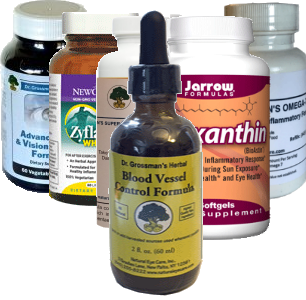 Anti-Inflammatory Eye and Whole Body Package 1 (1 month supply) Anti-Inflammatory Eye and Whole Body Package 1 (1 month supply)Essential antioxidants & herbs for overall eye & body health with natural anti-inflammatory properties. |
Essential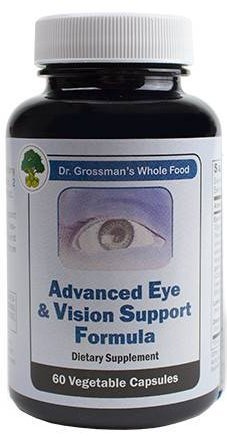 Advanced Eye & Vision Support Formula (whole food) 60 vcaps Advanced Eye & Vision Support Formula (whole food) 60 vcapsWhole food, wild crafted herbal vegetarian formula with vision antioxidants, chemical- and preservative-free. |
Essential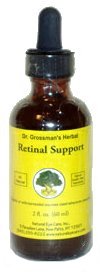 Retinal Support (wild-crafted herbal formula) 2 oz Retinal Support (wild-crafted herbal formula) 2 ozThis wild-crafted herbal formula by Dr. Grossman based on classic Chinese patent formulas to help support the retina and reduce general inflammation. |
Essential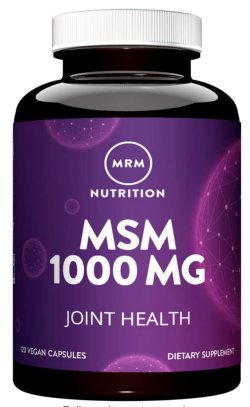 MSM (Methyl sulfonyl methane) Capsules 120 Capsules 1000mg MSM (Methyl sulfonyl methane) Capsules 120 Capsules 1000mgRepairs damaged tissue & aids nutrient absorption |
Essential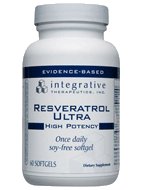 Resveratrol Ultra High Potency 60 gels - Antioxidant Resveratrol Ultra High Potency 60 gels - AntioxidantSupports blood vessel strength, fights free radicals. |
Essential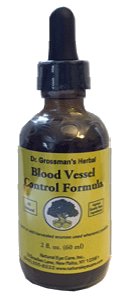 Dr. Grossman’s Blood Vessel Control Formula 2oz Dr. Grossman’s Blood Vessel Control Formula 2ozSupports blood vessel balance. |
| Very Important Vitamin D3 2000 IU 90 vcaps Astaxanthin 12 mg 30 Gels |
| Important Carlsons Super Omega-3 Gems 1000 mg 250 softgels |
Types of Macular swelling
 Cystoid macular edema (CME). This form of macular edema is characterized by the presence of cyst-like areas of fluid that accumulate in the macula and cause swelling and distortion. Researchers found that 44% of patients with moderately advanced retinitis pigmentosa have bilateral cystoid macular edema. CME is one of several characteristics of central retinal vein occlusion where there is obstruction of the major vein that returns blood from the eye to the circulatory system. It can develop after an occlusion, after eye surgery, in serious uveitis cases, and in other conditions.
Cystoid macular edema (CME). This form of macular edema is characterized by the presence of cyst-like areas of fluid that accumulate in the macula and cause swelling and distortion. Researchers found that 44% of patients with moderately advanced retinitis pigmentosa have bilateral cystoid macular edema. CME is one of several characteristics of central retinal vein occlusion where there is obstruction of the major vein that returns blood from the eye to the circulatory system. It can develop after an occlusion, after eye surgery, in serious uveitis cases, and in other conditions.
Diabetic macular edema (DME). About 3.8% of diabetic patients have been identified as having diabetic macular edema. Focal DME develops due to blood vessel abnormalities in the fovea of the eye (center of the macula); generally, diffuse DME is the widening or swelling of capillaries. DME includes clinically significant macular edema (CSME) in which treatment is required.
Microcystic macular edema (MME). This variant is characterized by microcysts that are limited to the inner nuclear layer of the retina, and it is typically associated with optic neuropathy as well as other nervous system conditions such as multiple sclerosis. It apparently is caused by deterioration in the inner retinal layers.
Focal macular swelling arises from swelling in the center of the macula where the fovea is located. Diffuse macular edema occurs when other capillaries in the retina are swollen.
Pathology
Edema occurs when fluid, such as blood or other fluids, leaks from weakened retinal blood vessels into various layers of the macula. It is common for those with health conditions such as diabetes, rheumatoid arthritis, age-related macular degeneration, chronic uveitis, and central retinal vein occlusion. It can develop in response to cataract surgery, high blood pressure, atherosclerosis, and the use of prescription drugs. It also could be idiopathic, meaning there is no specific cause determined.
Conventional Treatment
Treatment for swollen macula conditions may be oral medications, anti-inflammatory drops or medication is injected near the back of the eye.
Self Help
Taking targeted supplements and establishing healthy lifestyle habits are important, both for long-term help in reducing inflammation and for neutralizing free radicals that are produced in excess due to ongoing inflammation (which can destroy healthy cells and affect vision).
Wear wrap-around sunglasses with 100% UVA and UVB protection whenever out in the sun. The best lens color is amber, which neutralizes blue light. Brown is the next best color. Note: Cheaper glasses may have a coating to block out UV light that, over time, can rub off. Many people think it is the tint that helps protect one's eyes, but it is actually the UV filter on, or in, the lens that is helpful. A dark lens without UV protection increases pupil dilation allowing more light to enter the eyes.
Eliminate smoking. Smoking produces cyanide, a retinal toxin. A 2005 review of 17 research studies determined that the risk of macular degeneration in smokers is two to three times higher than in non-smokers. A 2015 study looked at this issue again, this time investigating specific damage to the macula as a result of smoking, and finding significant damage to many tissue layers of the macula.
Limit the amount of medications. Talk to your doctor or get a second opinion to make sure that 1). you are not taking more medications (both prescription and non-prescription) than you need, and 2). your medications do not conflict.
- See nutritional recommendations
- Healthy vision recommendations.
- Supplement your diet with a good multivitamin such as BioMax Food III and/or a good green drink such as Nano Greens.
Swelling types Symptoms Causes Self help More tips About central vision Conventional treatment
 info@naturaleyecare.com
info@naturaleyecare.com



 Home
Home



 Vision
Vision Vision
Vision



 Health
Health Health
Health Research/Services
Research/Services Pets
Pets About/Contact
About/Contact


